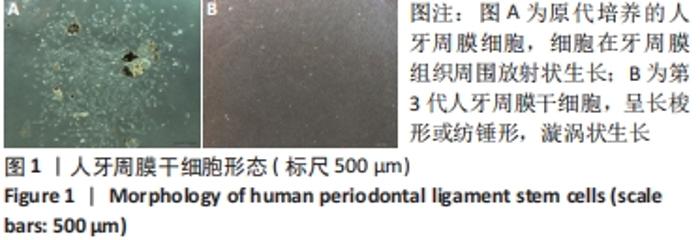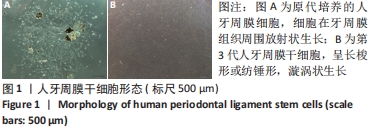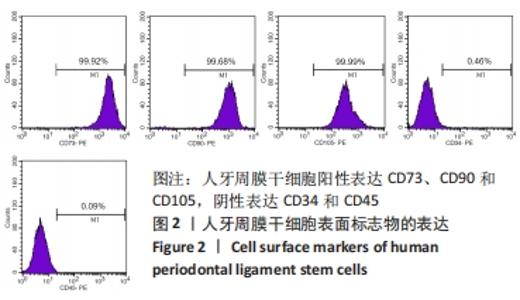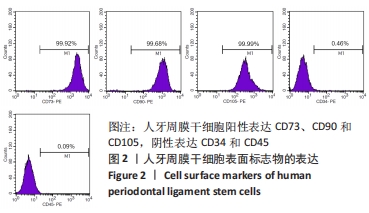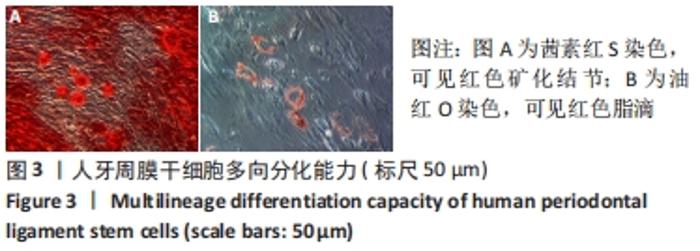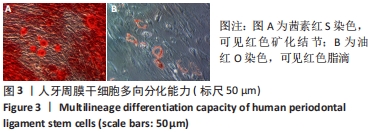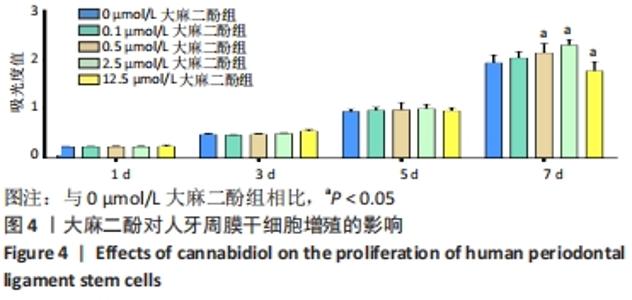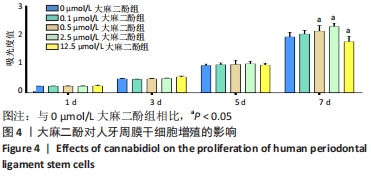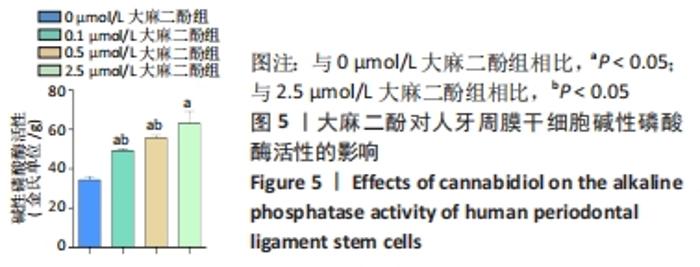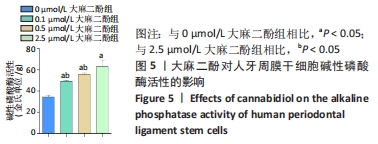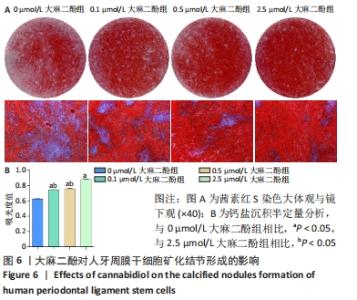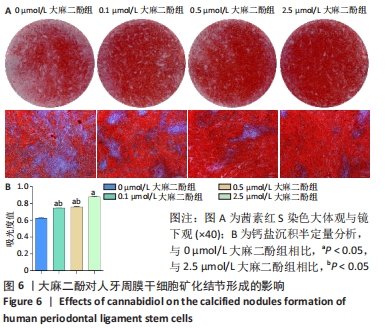Chinese Journal of Tissue Engineering Research ›› 2022, Vol. 26 ›› Issue (30): 4867-4872.doi: 10.12307/2022.730
Previous Articles Next Articles
Cannabidiol promotes proliferation and osteogenic differentiation of human periodontal ligament stem cells
Li Xiheng1, Li Xinyue1, Mao Tianjiao2, Yang Wanqi3, Tang Liang1, Li Jiang1, 2
- 1Department of Prosthodontics, 3Department of Orthodontics, Hospital of Stomatology, Jilin University, Changchun 130021, Jilin Province, China; 2Department of Prosthodontics, Affiliated Stomatology Hospital, Guangzhou Medical University, Guangzhou 510150, Guangdong Province, China
-
Received:2021-10-19Accepted:2021-11-13Online:2022-10-28Published:2022-03-29 -
Contact:Li Jiang, Chief physician, Professor, Doctoral supervisor, Department of Prosthodontics, Hospital of Stomatology, Jilin University, Changchun 130021, Jilin Province, China; Department of Prosthodontics, Affiliated Stomatology Hospital, Guangzhou Medical University, Guangzhou 510150, Guangdong Province, China -
About author:Li Xiheng, Master candidate, Department of Prosthodontics, Hospital of Stomatology, Jilin University, Changchun 130021, Jilin Province, China
CLC Number:
Cite this article
Li Xiheng, Li Xinyue, Mao Tianjiao, Yang Wanqi, Tang Liang, Li Jiang. Cannabidiol promotes proliferation and osteogenic differentiation of human periodontal ligament stem cells[J]. Chinese Journal of Tissue Engineering Research, 2022, 26(30): 4867-4872.
share this article
Add to citation manager EndNote|Reference Manager|ProCite|BibTeX|RefWorks
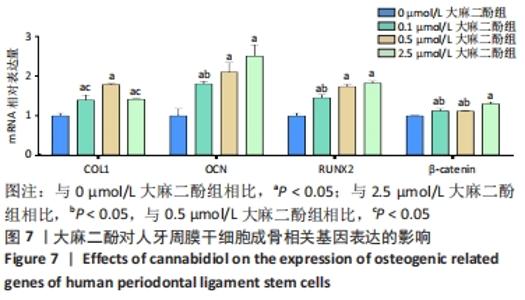
2.4.3 成骨相关基因表达 成骨诱导7 d后,通过qPCR检测成骨相关基因COL1、OCN和RUNX2的mRNA表达。与对照组相比,所有大麻二酚组COL1、OCN和RUNX2的mRNA表达水平均显著上调(P < 0.05)。对于COL1基因,0.5 μmol/L大麻二酚组mRNA表达水平升高至对照组的(1.791±0.026)倍,明显高于0.1,2.5 μmol/L大麻二酚组(P < 0.05)。对于OCN基因,2.5 μmol/L大麻二酚组mRNA表达水平升高至对照组的(2.504±0.280)倍,明显高于0.1 μmol/L大麻二酚组(P < 0.05),但与0.5 μmol/L大麻二酚组无明显差异(P > 0.05)。对于RUNX2基因,2.5 μmol/L大麻二酚组mRNA表达水平升高至对照组的(1.830±0.052)倍,明显高于0.1 μmol/L大麻二酚组(P < 0.05),但与0.5 μmol/L大麻二酚组无明显差异(P > 0.05)。此外,还分析了β-catenin的mRNA表达水平以评估大麻二酚对Wnt/β-catenin信号通路的影响,大麻二酚显著上调了β-catenin的mRNA表达水平(P < 0.05),2.5 μmol/L大麻二酚组mRNA表达水平升高至对照组的(1.300±0.045)倍,明显高于0.1,0.5 μmol/L大麻二酚组(P < 0.05),见图7。"
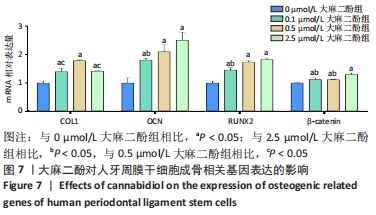
| [1] KNIGHT ET, MURRAY THOMSON W. A public health perspective on personalized periodontics. Periodontol 2000. 2018;78(1):195-200. [2] BOSSHARDT DD, STADLINGER B, TERHEYDEN H. Cell-to-cell communication-periodontal regeneration. Clin Oral Implants Res. 2015; 26(3):229-239. [3] XU XY, LI X, WANG J, et al. Concise Review: Periodontal Tissue Regeneration Using Stem Cells: Strategies and Translational Considerations. Stem Cells Transl Med. 2019;8(4):392-403. [4] SEO BM, MIURA M, GRONTHOS S, et al. Investigation of multipotent postnatal stem cells from human periodontal ligament. Lancet. 2004; 364(9429):149-155. [5] ZHANG Y, XING Y, JIA L, et al. An In Vitro Comparative Study of Multisource Derived Human Mesenchymal Stem Cells for Bone Tissue Engineering. Stem Cells Dev. 2018;27(23):1634-1645. [6] ZHENG C, CHEN J, LIU S, et al. Stem cell-based bone and dental regeneration: a view of microenvironmental modulation. Int J Oral Sci. 2019;11(3):23. [7] LIU AQ, HU CH, JIN F, et al. Contributions of Bioactive Molecules in Stem Cell-Based Periodontal Regeneration. Int J Mol Sci. 2018;19(4):1016. [8] BERGAMASCHI MM, QUEIROZ RH, ZUARDI AW, et al. Safety and side effects of cannabidiol, a Cannabis sativa constituent. Curr Drug Saf. 2011;6(4):237-249. [9] ATALAY S, JAROCKA-KARPOWICZ I, SKRZYDLEWSKA E. Antioxidative and Anti-Inflammatory Properties of Cannabidiol. Antioxidants (Basel). 2019;9(1):21. [10] PISANTI S, MALFITANO AM, CIAGLIA E, et al. Cannabidiol: State of the art and new challenges for therapeutic applications. Pharmacol Ther. 2017;175:133-150. [11] BRITCH SC, BABALONIS S, WALSH SL. Cannabidiol: pharmacology and therapeutic targets. Psychopharmacology (Berl). 2021;238(1):9-28. [12] KOGAN NM, MELAMED E, WASSERMAN E, et al. Cannabidiol, a Major Non-Psychotropic Cannabis Constituent Enhances Fracture Healing and Stimulates Lysyl Hydroxylase Activity in Osteoblasts. J Bone Miner Res. 2015;30(10):1905-1913. [13] KAMALI A, ORYAN A, HOSSEINI S, et al. Cannabidiol-loaded microspheres incorporated into osteoconductive scaffold enhance mesenchymal stem cell recruitment and regeneration of critical-sized bone defects. Mater Sci Eng C Mater Biol Appl. 2019;101:64-75. [14] LI D, LIN Z, MENG Q, et al. Cannabidiol administration reduces sublesional cancellous bone loss in rats with severe spinal cord injury. Eur J Pharmacol. 2017;809:13-19. [15] NAPIMOGA MH, BENATTI BB, LIMA FO, et al. Cannabidiol decreases bone resorption by inhibiting RANK/RANKL expression and pro-inflammatory cytokines during experimental periodontitis in rats. Int Immunopharmacol. 2009;9(2):216-222. [16] KANG MA, LEE J, PARK SH. Cannabidiol induces osteoblast differentiation via angiopoietin1 and p38 MAPK. Environ Toxicol. 2020;35(12):1318-1325. [17] SCHMUHL E, RAMER R, SALAMON A, et al. Increase of mesenchymal stem cell migration by cannabidiol via activation of p42/44 MAPK. Biochem Pharmacol. 2014;87(3):489-501. [18] QI X, LIU C, LI G, et al. Investigation of in vitro odonto/osteogenic capacity of cannabidiol on human dental pulp cell. J Dent. 2021;109: 103673. [19] GIBON E, LU L, GOODMAN SB. Aging, inflammation, stem cells, and bone healing. Stem Cell Res Ther. 2016;7:44. [20] SUI BD, HU CH, LIU AQ, et al. Stem cell-based bone regeneration in diseased microenvironments: Challenges and solutions. Biomaterials. 2019;196:18-30. [21] APOSTU D, LUCACIU O, MESTER A, et al. Cannabinoids and bone regeneration. Drug Metab Rev. 2019;51(1):65-75. [22] PAGANO S, CONIGLIO M, VALENTI C, et al. Biological effects of Cannabidiol on normal human healthy cell populations: Systematic review of the literature. Biomed Pharmacother. 2020;132:110728. [23] MILLER H, DE LEO N, BADACH J, et al. Role of marijuana components on the regenerative ability of stem cells. Cell Biochem Funct. 2021; 39(3):432-441. [24] VIMALRAJ S. Alkaline phosphatase: Structure, expression and its function in bone mineralization. Gene. 2020;754:144855. [25] GREGORY CA, GUNN WG, PEISTER A, et al. An Alizarin red-based assay of mineralization by adherent cells in culture: comparison with cetylpyridinium chloride extraction. Anal Biochem. 2004;329(1):77-84. [26] ALFORD AI, KOZLOFF KM, HANKENSON KD. Extracellular matrix networks in bone remodeling. Int J Biochem Cell Biol. 2015;65:20-31. [27] KOMORI T. Regulation of Proliferation, Differentiation and Functions of Osteoblasts by Runx2. Int J Mol Sci. 2019;20(7):1694. [28] HAN Y, YOU X, XING W, et al. Paracrine and endocrine actions of bone-the functions of secretory proteins from osteoblasts, osteocytes, and osteoclasts. Bone Res. 2018;6:16. [29] CLEVERS H, NUSSE R. Wnt/beta-catenin signaling and disease. Cell. 2012;149(6):1192-1205. [30] DUAN P, BONEWALD LF. The role of the wnt/beta-catenin signaling pathway in formation and maintenance of bone and teeth. Int J Biochem Cell Biol. 2016;77(Pt A):23-29. [31] MAO L, LIU J, ZHAO J, et al. Effect of micro-nano-hybrid structured hydroxyapatite bioceramics on osteogenic and cementogenic differentiation of human periodontal ligament stem cell via Wnt signaling pathway. Int J Nanomedicine. 2015;10:7031-7044. [32] ZHENG DH, WANG XX, MA D, et al. Erythropoietin enhances osteogenic differentiation of human periodontal ligament stem cells via Wnt/β-catenin signaling pathway. Drug Des Devel Ther. 2019;13: 2543-2552. [33] NIE F, ZHANG W, CUI Q, et al. Kaempferol promotes proliferation and osteogenic differentiation of periodontal ligament stem cells via Wnt/β-catenin signaling pathway. Life Sci. 2020;258:118143. [34] VALLÉE A, LECARPENTIER Y, VALLÉE JN. Cannabidiol and the Canonical WNT/β-Catenin Pathway in Glaucoma. Int J Mol Sci. 2021;22(7):3798. [35] VALLÉE A, VALLÉE JN, LECARPENTIER Y. Potential role of cannabidiol in Parkinson’s disease by targeting the WNT/β-catenin pathway, oxidative stress and inflammation. Aging (Albany NY). 2021;13(7): 10796-10813. |
| [1] | Yao Xiaoling, Peng Jiancheng, Xu Yuerong, Yang Zhidong, Zhang Shuncong. Variable-angle zero-notch anterior interbody fusion system in the treatment of cervical spondylotic myelopathy: 30-month follow-up [J]. Chinese Journal of Tissue Engineering Research, 2022, 26(9): 1377-1382. |
| [2] | Liang Xuezhen, Yang Xi, Li Jiacheng, Luo Di, Xu Bo, Li Gang. Bushen Huoxue capsule regulates osteogenic and adipogenic differentiation of rat bone marrow mesenchymal stem cells via Hedgehog signaling pathway [J]. Chinese Journal of Tissue Engineering Research, 2022, 26(7): 1020-1026. |
| [3] | Luo Xiaoling, Zhang Li, Yang Maohua, Xu Jie, Xu Xiaomei. Effect of naringenin on osteogenic differentiation of human periodontal ligament stem cells [J]. Chinese Journal of Tissue Engineering Research, 2022, 26(7): 1051-1056. |
| [4] | Zhang Jinglin, Leng Min, Zhu Boheng, Wang Hong. Mechanism and application of stem cell-derived exosomes in promoting diabetic wound healing [J]. Chinese Journal of Tissue Engineering Research, 2022, 26(7): 1113-1118. |
| [5] | An Weizheng, He Xiao, Ren Shuai, Liu Jianyu. Potential of muscle-derived stem cells in peripheral nerve regeneration [J]. Chinese Journal of Tissue Engineering Research, 2022, 26(7): 1130-1136. |
| [6] | Gao Yujin, Peng Shuanglin, Ma Zhichao, Lu Shi, Cao Huayue, Wang Lang, Xiao Jingang. Osteogenic ability of adipose stem cells in diabetic osteoporosis mice [J]. Chinese Journal of Tissue Engineering Research, 2022, 26(7): 999-1004. |
| [7] | Chen Xiaoxu, Luo Yaxin, Bi Haoran, Yang Kun. Preparation and application of acellular scaffold in tissue engineering and regenerative medicine [J]. Chinese Journal of Tissue Engineering Research, 2022, 26(4): 591-596. |
| [8] | Kang Kunlong, Wang Xintao. Research hotspot of biological scaffold materials promoting osteogenic differentiation of bone marrow mesenchymal stem cells [J]. Chinese Journal of Tissue Engineering Research, 2022, 26(4): 597-603. |
| [9] | Shen Jiahua, Fu Yong. Application of graphene-based nanomaterials in stem cells [J]. Chinese Journal of Tissue Engineering Research, 2022, 26(4): 604-609. |
| [10] | Zhang Tong, Cai Jinchi, Yuan Zhifa, Zhao Haiyan, Han Xingwen, Wang Wenji. Hyaluronic acid-based composite hydrogel in cartilage injury caused by osteoarthritis: application and mechanism [J]. Chinese Journal of Tissue Engineering Research, 2022, 26(4): 617-625. |
| [11] | Li Hui, Chen Lianglong. Application and characteristics of bone graft materials in the treatment of spinal tuberculosis [J]. Chinese Journal of Tissue Engineering Research, 2022, 26(4): 626-630. |
| [12] | Gao Cangjian, Yang Zhen, Liu Shuyun, Li Hao, Fu Liwei, Zhao Tianyuan, Chen Wei, Liao Zhiyao, Li Pinxue, Sui Xiang, Guo Quanyi. Electrospinning for rotator cuff repair [J]. Chinese Journal of Tissue Engineering Research, 2022, 26(4): 637-642. |
| [13] | He Yunying, Li Lingjie, Zhang Shuqi, Li Yuzhou, Yang Sheng, Ji Ping. Method of constructing cell spheroids based on agarose and polyacrylic molds [J]. Chinese Journal of Tissue Engineering Research, 2022, 26(4): 553-559. |
| [14] | He Guanyu, Xu Baoshan, Du Lilong, Zhang Tongxing, Huo Zhenxin, Shen Li. Biomimetic orientated microchannel annulus fibrosus scaffold constructed by silk fibroin [J]. Chinese Journal of Tissue Engineering Research, 2022, 26(4): 560-566. |
| [15] | Dong Yi, Shan Shuai, Liu Jialin, Han Xiangzhen, He Huiyu. Circular RNA mmu_circ_0001775 knockdown improves the osteogenic ability of mouse bone marrow mesenchymal stem cells [J]. Chinese Journal of Tissue Engineering Research, 2022, 26(30): 4767-4772. |
| Viewed | ||||||
|
Full text |
|
|||||
|
Abstract |
|
|||||
